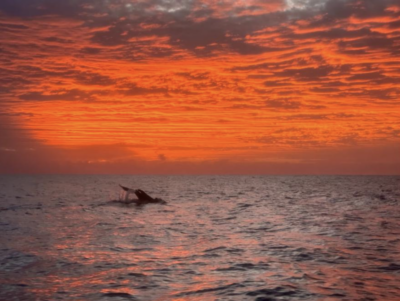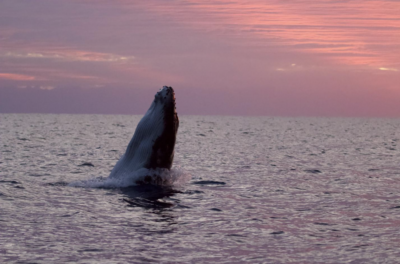As anthropogenic noise continues to increase in our oceans, animals who employ acoustic communication have become increasingly challenged to make their sounds heard and understood by other members of their species. This artificial noise interferes with behaviors essential to individual and species survival, such as acts of courtship, displays of dominance, communication of resources, feeding behaviors, and navigation.
One animal whose form of communication has become increasingly encroached upon by anthropogenic noise is the humpback whale (Megaptera novaeangliae). While it is not completely known why male humpbacks sing, this behavior mainly occurs in breeding grounds and migratory corridors, indicating that it is important for comparing and communicating fitness to females and to other male singers. Understanding the effect of human-created noises such as boat sounds on humpback song is essential in advancing productive conservation initiatives.
Humpback whales naturally adapt their singing intensity in response to the given amount of naturally occurring noise in their environment; noises such as wind, water, and reef sounds. The unconscious act of adjusting vocal effort in the presence of other sounds is known as the Lombard effect and is present in many acoustically communicating animals. However, it is unknown if the Lombard effect is present in singing humpback males in relation to vessel noise.
A recent study conducted by Girola et al. (April 2023) at the University of Queensland sought to answer this question by studying eastern Australia’s singing males’ Lombard response to ambient wind noise as compared to wind noise accompanied by vessel noise. The scientists hypothesized that if the males’ Lombard effect accounted for vessel noise as well as wind noise, then their singing would change accordingly in the presence of a vessel as compared to when no vessel was present.
In September and October of 2010, Girola et al. recorded humpback song in Peregian Beach, a migratory corridor for humpbacks moving southbound towards Antarctica from breeding grounds in the Great Barrier Reef. The researchers employed the use of four stationary buoys to record singers within 5km of the designated study area, and they methodically drove a vessel along an established route. Recordings disturbed by the sounds of rain, other vessels, or loud fish choruses were excluded from the study to isolate the sounds of wind and the research vessel noises.
After extensive song unit analysis, the authors concluded that while humpback singers adjust their songs according to wind levels, they do not do so for vessel noises. In other words, the Lombard effect is present in response to varying levels of wind noise but not present in response to vessel noises. While this result suggests that other coping strategies could be at play, no other ones have been scientifically studied.
In conclusion, this study reinforces the importance of understanding the effect of anthropogenic noises on humpback whale behavior. Knowing that singers do not employ the Lombard effect when accounting for vessel noise opens doors for more studies to be done on alternate coping mechanisms. This result could also suggest that whales do not, in fact, have a fixed strategy in place to deal with this type of anthropogenic noise, considering their lack of song adjustment in response to vessel noise. If the latter is true, then anthropogenic noise could pose a detrimental problem for humpback whale vocalization and its associated behaviors.
Specifically in relation to our research, the waters around Rarotonga are part of the migratory corridor of the last population of endangered migrating humpback whales in the world. In these waters, humpbacks opportunistically breed and birth their young. Therefore, conservation initiatives in the Cook Islands should aim to control vessel noise in proximity to singing males. It is imperative to understand the effects of vessel noise to best protect these amazing animals.
References:
1 Payne R, McVay S. 1971 Songs of Humpback whales. Science 173, 585-597. (doi: 10.1126/science.173.3997.585)
2 Dunlop RA, Cato DH, Noad MJ. 2014 Evidence of a Lombard Response in migrating humpback whales (Megaptera novaeangliae). J. Acoust. Soc. Am. 136, 430-437. (doi:10.1121/1.4883598)
3 Whitlock, J. (2012). Understanding the Lombard Effect. New Zealand Acoustics, 25(2), 14–17.
4 Girola E, Dunlop RA, Noad MJ. 2023 Singing humpback whales respond to wind noise, but not to vessel noise. Proc. R. Soc. B 290: 20230204. https://doi.org/10.1098/rspb.2023.0204



